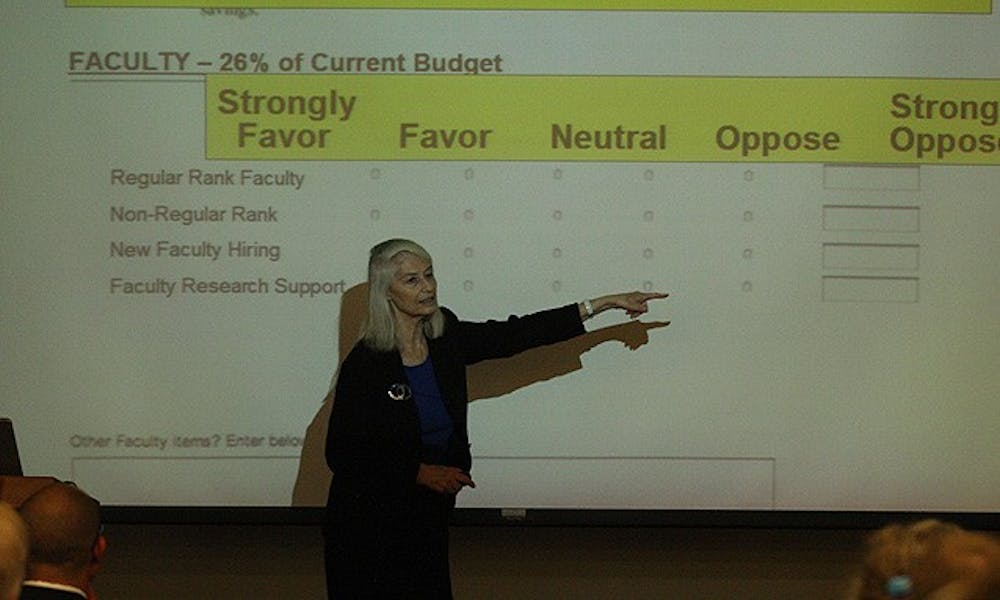The Arts and Sciences Council discussed the financial outlook for the year at its first meeting of the semester.
Alvin Crumbliss, interim dean of the faculty of Arts and Sciences and dean of Trinity College, addressed Council members Thursday and discussed Trinity’s financial state.
Crumbliss emphasized change, entrepreneurship and sustainability as keys to maintaining a balanced budget and reducing costs.
“Six hundred forty five regular ranked faculty [members] cannot be sustained in the world of a balanced budget,” he said. “We’ve been forced to reduce staff, hold salaries constant for two years and cut back our department budgets by 10 percent.”
Crumbliss added that next year, the number of faculty members added must be fewer than the number of faculty members who leave the University.
Erik Wibbels, associate professor of political science, asked how the cuts would occur across the academic departments.
“There was a similarly difficult portrayal of the budget last year in the same speech,” Wibbels said. “[This] implies the shrinking of the college in terms of the faculty. How are cuts going to be allocated?”
Crumbliss said the University has been working proactively with faculty who have expressed interest in retiring, and will largely reduce the size of the faculty through attrition.
Last October, Provost Peter Lange announced that the University would create a central fund for deans to add to the retirement packages of professors who meet the Rule of 75—meaning their age and their years of service sum to at least 75—and would commit to retire by June 30, 2011. In April, Lange said 14 professors had accepted the incentive.
Despite budgetary constraints, however, Crumbliss stressed that undergraduate research and other new programs—including laboratories in humanities classes and global education initiatives—will continue to receive substantial funding.
The council also evaluated two online courses that were offered for the first time this summer.
Paula Gilbert, associate dean and director of Duke continuing studies and summer session, emphasized the growing amount of online courses in other University departments—like the Fuqua School of Business and the School of Nursing—and the unique advantages of offering classes online.
“We are looking to identify new ways to make intellectual connections with undergraduates and all kinds of summer experiences they engage in,” Gilbert said.
Faculty members, however, were reluctant to support the expansion of online courses. The preliminary results of the faculty Budget Solutions Poll revealed strong opposition to online classes.
Council Chair Ruth Day shared one comment, written by a faculty member who responded to the survey, that read, “Are you insane? Is this buy-a-degree-online U or is it Duke University?”
Gilbert, however, said that faculty members may not have a clear understanding of online courses and that the prevalence of technology in classrooms has blurred the definitions of traditional classrooms and online courses. She added that Harvard and Stanford Universities both offer classes online.
Further, Gilbert said based on a recent evaluations compiled by the Office of Assessment, Duke’s two online summer courses were both effective and educational despite some technological glitches.
Kristen Stephens, assistant professor of the practice in the Program in Education, taught EDUC 168: “Reform in American Classrooms.” Stephens said that many students felt more engaged in this online class than in face-to-face courses.
“[Students] are very used to multitasking,” Stephens said. “[They can listen] to people in class and... browse the Internet and get more information about what they are studying, what they are interested in.”
Cathy Shuman, visiting assistant professor of English, taught ENGLISH 109S: “Special Topics in Creative Writing,” this summer. She said online was the only option for the class because students were located in various countries.
Shuman added that although she initially missed the traditional classroom setting, students actually provided more thoughtful comments in her online course.
In other business:
Following the presentations on the online courses pilot program, Director of DukeEngage Eric Mlyn discussed how DukeEngage is affecting student-faculty interaction. Mlyn, who was reappointed Tuesday as DukeEngage director through June 30, 2016, said although students mostly have positive experiences with DukeEngage, they do not tend to enroll in Fall courses that expand upon their experiences. He added that athletes were underrepresented in the program and Asian students were slightly overrepresented.
Get The Chronicle straight to your inbox
Signup for our weekly newsletter. Cancel at any time.

